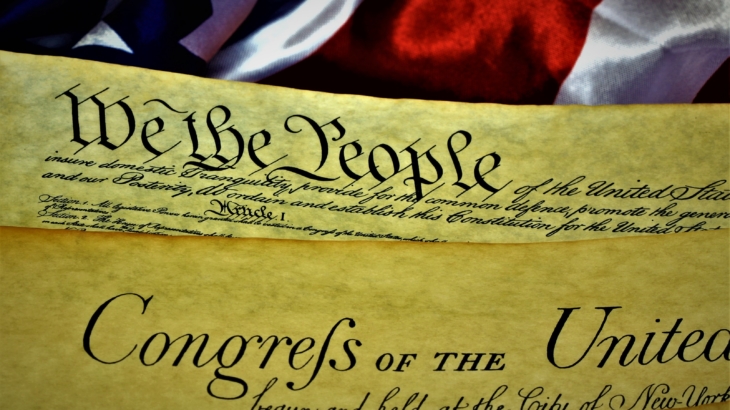Principle of Free Government and Free Society
 Essay Read by Constituting America Founder, Actress Janine Turner
Essay Read by Constituting America Founder, Actress Janine Turner
Abraham Lincoln concluded his famous Gettysburg Address with the hope that “government of the people, by the people, for the people, shall not perish from the earth.”
Why would such a government perishing be so bad? After all, myriad regimes have started, fallen, and now are no more–no better than a footnote in history books. Moreover, a popular government, one so focused on the people, hasn’t been the norm for most of human history.
But we should not merely be looking for the most famous nor the most common governments. We should be looking for the best. Lincoln here does that. For he describes the essential components needed for a free society and a free government.
Lincoln summarizes America’s political principles through three phrases each focused on the people. Each builds off a central assumption about human beings, namely that they are inherently equal. Thus, the origin of political rule, the administration of political rule, and the purpose of political rule all must be grounded in the famous phrase of the Declaration of Independence that “all men are created equal.”
For Lincoln, “Of the people” says that our government originates from the body of citizens. The people pre-existed the government and consciously created that government. This point matters greatly. In political philosophy, much is said about the nature and location of sovereignty–ultimate, unrivaled authority to rule. Lincoln here succinctly says that the people are sovereign, that political power originates with them. The authority of governments, by contrast, is delegated, derivative of the people’s power. Nor was the government the creation of one proto-king or a few elites. The people together were the source.
We here have a basis for freedom. If the government created the people, then we would exist to serve it. But if the people establish the government, then that government must serve us. Or if one or a few had done so, the rest of us would be subject to him or to them. Our United States Constitution, which begins “We, the People,” makes clear the origin of the government’s power is from us.
“By the people” declares the means through which government exercises its power. The focus remains on the people. For a government by the people means that citizens administer the government they created. They do not merely leave it to others but engage in active self-rule. We do so in three main ways. First, we all can engage in discussion with each other in hopes of learning from and persuading with our neighbors. Second, do so through voting for those who will directly exercise our power in office. Third, and related, we can self-govern by holding office.
This point also matters for a free society and a free government. The Founders understood that human nature struggled with a temptation to selfishness. Monarchy risked one man ruling for his own good at the expense of the rest. Aristocracy threatened a few elites wielding political power only to help themselves. A popular government sought to direct such self-interest toward the good of the greatest number. At its best, this popular rule by the people would pursue what is called the “common good.” The Founders knew that the people also could be selfish and thus that the majority could harm the minority. But they thought the majority will would mirror the common good more often than the whims of one or a few. And they put in place systems like representation, federalism, and separation of powers to mitigate such selfish tendencies from having free reign even in popular rule.
Finally, “for the people” states for whom the government acts. All governments are “for” someone within their borders. They make laws and enforce them with the good of this group in mind. In acting for the people, Lincoln assumes that popular government should be oriented toward the good of all its citizens. Here we see the underpinnings of the Constitution’s commitment to “promote the general Welfare” as described its Preamble. Just as rule did not originate with one person or a few, nor was it administered by one or a few, so our government would not seek the benefit of one or a few. Our belief that government exists to protect natural or human rights, summarized as life, liberty, and the pursuit of happiness, forms the core of what Lincoln meant by government existing “for the people.” And in protecting those rights, we can rest secure in our freedom, exercising it in pursuit of a happy life.
Thus, we, too, should hope that this kind of government does not perish from the earth. We have been blessed in that government’s establishment by our ancestors and its maintenance by those who came before us. We have not sunk into despotism because we have not lost the grounding of political power and purpose in the people. At the same time, we always face the risk of losing this precious gift. It remains to us to keep our republic, guarding it from all foes external and internal. The task is up to us. We are the people, after all.
 Adam M. Carrington is an Associate Professor of Politics at Hillsdale College. There, he teaches on matters of Constitutional law, American political institutions, and separation of powers. His writing has appeared in such popular forums as The Wall Street Journal, The Hill, National Review, and Washington Examiner. His book on the jurisprudence of Justice Stephen Field was published in 2017 by Lexington. Carrington received his B.A. from Ashland University and his M.A. and Ph.D. from Baylor University. He lives in Hillsdale with his wife and their two daughters.
Adam M. Carrington is an Associate Professor of Politics at Hillsdale College. There, he teaches on matters of Constitutional law, American political institutions, and separation of powers. His writing has appeared in such popular forums as The Wall Street Journal, The Hill, National Review, and Washington Examiner. His book on the jurisprudence of Justice Stephen Field was published in 2017 by Lexington. Carrington received his B.A. from Ashland University and his M.A. and Ph.D. from Baylor University. He lives in Hillsdale with his wife and their two daughters.
Click here for First Principles of the American Founding 90-Day Study Schedule.
Click here to receive our Daily 90-Day Study Essay emailed directly to your inbox.




Very Good!